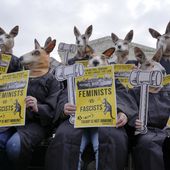From combined dispatches
NAIROBI, Kenya — If Africans welcoming home a native son thought that rising Democratic star Sen. Barack Obama of Illinois came only in praise of the continent of his roots, they were mistaken.
In South Africa last week, he took the government to task for its tepid response to the AIDS epidemic that has ravaged sub-Saharan Africa. He also criticized the government of President Thabo Mbeki for its “quiet diplomacy” with Zimbabwe, demanding that more pressure be put on Zimbabwean President Robert Mugabe.
Kenya risks losing its status as a model of African democracy if it does not urgently crack down on corruption that has reached crisis levels and stifled development, Mr. Obama said yesterday.
Western nations must ensure they practice what they preach to African nations about graft, said Mr. Obama, a member of the Senate Foreign Relations Committee, who is using the trip in part to polish his credentials in foreign policy.
“While corruption is a problem we all share, here in Kenya it is a crisis — a crisis that’s robbing an honest people of the opportunities they have fought for,” Mr. Obama told an audience at the University of Nairobi.
Mr. Obama, born in Hawaii to a Kenyan father and white American mother, is on his first trip to Kenya since being elected to the Senate in 2004 and has become an idol to many in the East African country, who see him as a native son.
The senator, who stopped in South Africa last week, also will travel to Djibouti and Chad, to visit refugees from Sudan’s Darfur region, on a trip he hopes will bring new focus on Africa’s importance.
He scrapped plans to visit the Democratic Republic of the Congo and Rwanda at the request of the U.S. Embassy in Congo because of postelection fighting in that country’s capital, Kinshasa.
Yesterday, Mr. Obama said Kenya had made great strides since independence from Britain in 1963 and remained “a model of representative democracy, a place where many different ethnic factions have found a way to live and work together.”
But corruption is threatening all that by hampering development and the creation of strong, accountable institutions, he said.
“If the people cannot trust their government to do the job for which it exists — to protect them and promote their common welfare — then all else is lost. That is why the struggle of corruption is one of the great struggles of our time,” Mr. Obama said.
He said graft had allowed Felicien Kabuga, wanted on war-crime charges in Rwanda’s 1994 genocide, to find safe haven in Kenya and had infected the police force to the point that it was “a source of insecurity.”
The government of President Mwai Kibaki, elected in 2002 on a promise to wipe out the graft that had characterized the 24-year rule of predecessor Daniel arap Moi, has itself been hit by a string of corruption scandals in the past year.
Mr. Obama arrived in Kenya on Thursday for his first visit to his father’s homeland since taking office.
On Sunday, he visited a project to start small businesses and stopped by an AIDS prevention program in Kibera, one of the world’s biggest slums, where he told residents that he wants everyone in the United States to know about their plight and promised to push the U.S. and Kenyan governments to help.
The AIDS prevention program is affiliated with the University of North Carolina. Mr. Obama also met with students who are part of local abstinence campaigns. The program, called Carolina for Kibera, estimates that one in five of the slum’s population is HIV-positive.
AIDS prevention has been a theme of Mr. Obama’s visit. On Saturday, he and his wife, Michelle, underwent public HIV tests at a hospital in Kisumu in an effort to reduce the public stigma associated with HIV testing.



Please read our comment policy before commenting.